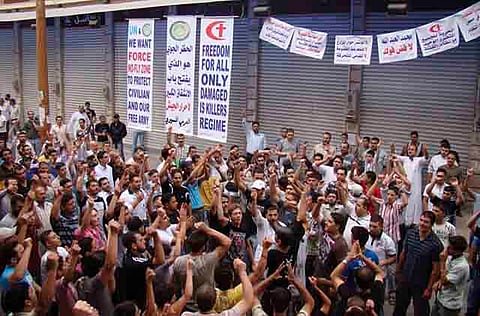The Failure of the anti-US discourse
Despite its rhetoric on freedom of expression and rights, American foreign policy is designed to protect its interests in the Arab world

Any Arab, in any country, irrespective of sect, economic status or education, knows that the US foreign policy towards the Arab world is iniquitous. There is ample evidence to that effect — most notable is the incomprehensibly unequivocal support for Israel and all its violations of international law.
Another example is the reluctant and belated US support for pro-democracy movements in countries with governments that are or had been close Washington allies. People in this part of the world are well aware that Washington — despite its rhetoric in favour of freedom of expression, human rights and democratic principles — steers its Arab policy strictly in line with its perceived interests, frequently to the detriment of lofty ideals.
On the other side of this rhetoric lies an anti-American discourse popular everywhere in the region, and championed in particular by some of its presidents-for-life, who, thanks to the Arab Spring, have shrunk in number. This ostensibly nationalistic discourse often offered its adepts immunity from criticism. Few dared to publicly question or criticise exponents of ‘anti-Americanism' for fear of being labelled American apologists — or worse.
This is no longer the case.
One of the more fascinating features of the Arab Spring is that the popular uprisings did not distinguish between pro- and anti-American regimes. The anti-American discourse of the Syrian and Libyan leaders offered them no protection against the ire of their people. Even Hezbollah, once the darling of the Arab Street, is now having its flag trampled by Syrian demonstrators because of its support for Bashar Al Assad.
Syrians and Libyans, who have long understood that the hypocritical US rhetoric was in fact vitiated by Washington's national interests, now also recognise that the hypocritical anti-American rhetoric of their leaders was vitiated by the interest of the ruling elite. Both insincere discourses — one serving the interests of a nation, the other serving the interests of a few.
Living standards
In Syria, more than four decades of rule by the Al Assads has resulted in limited improvement in standard of living despite that country's significant resources. Syria's per capita income is currently estimated at $4,800, while that of neighbouring Jordan — a country with far fewer resources — is $5,400. The per capita income of another neighbour, Lebanon — victim of a prolonged civil war and, again, enjoying fewer natural resources than Syria — is estimated at $14,400.
Quality of life indices all place Syria somewhere near the bottom of their rankings, below both Lebanon and Jordan.
Damascus has also failed to deliver on its vaunted promise to establish military parity with Israel. In his assessment of Syrian military readiness, Anthony Cordesman writes that "the bulk of the army is now… a static garrison force with limited real-world manoeuvre… it is largely defensive in character, lacks leadership, and has suffered from serious corruption as a result of nepotism, political favouritism, and the impact of deployment in Lebanon". Maintaining massive equipment, writes Cordesman, has priority over maintenance or sustainability.
The Syrian Air Force, continues Cordesman, suffers from even "more severe qualitative problems". The air force "is in many ways more a military museum dedicated to obsolete Soviet-bloc forms of aerial combat than a modern air force".
The tragedy of the anti-American discourse is that it had transformed what should have been a truly nationalistic narrative into a parody. It has delivered little except talk, and, by being essentially anti-western, the narrative discouraged those who fell under its spell from embracing modernity.
Calls for democracy, human rights, gender equality, freedom of expression, and even technological advancement, were dismissed as American or western values, foreign to Arab culture.
The Arab Spring has put paid to this demagoguery in a number of countries. Hopefully, Syrians, Libyans, as well as Egyptians and Tunisians will now be able to embrace modernity more openly, and more passionately, while also recognising American foreign policy for what it is.
Ramez Maluf is an associate professor at the Lebanese American University in Beirut.



